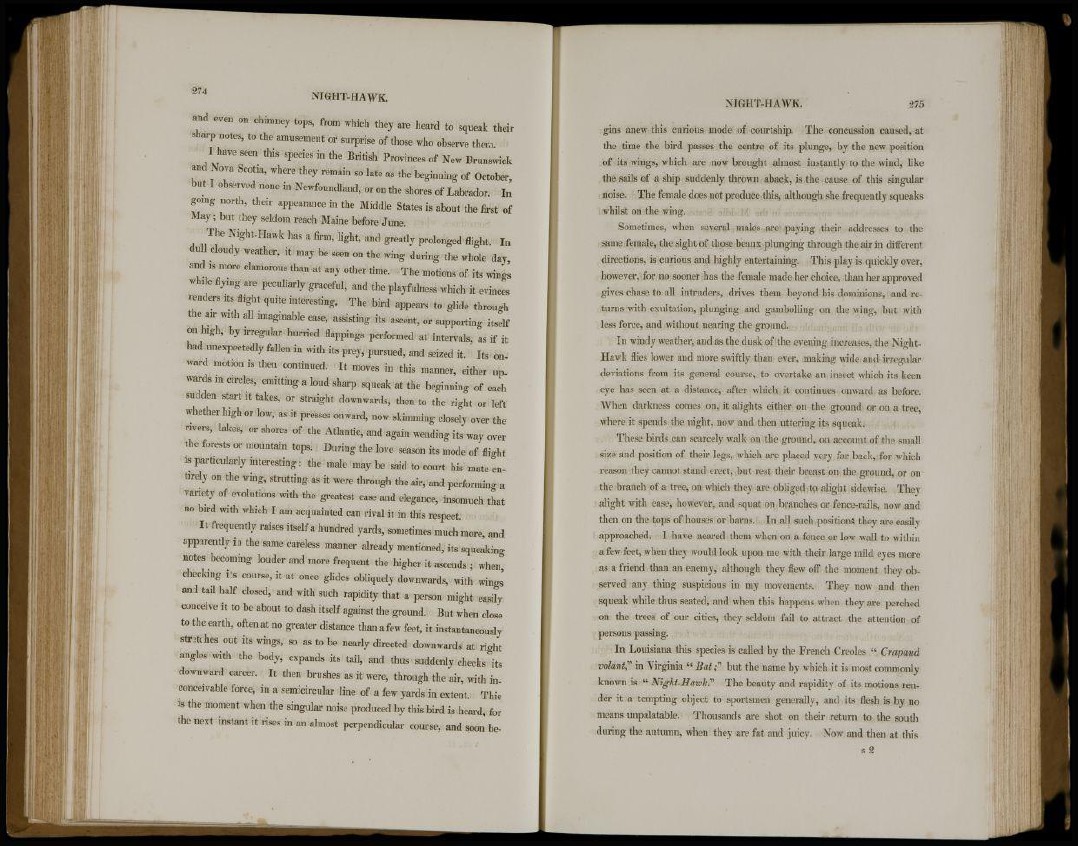
and even on chimney tops, from which they are heard to squeak their
sharp notes, to the amusement or surprise of those who observe them.
I have seen this species in the British Provinces of New Brunswick
and Nova Scotia, where they remain so late as the beginning of October,
but I observed none in Newfoundland, or on the shores of Labrador. In
going north, their appearance in the Middle States is about the first of
May; but chey seldom reach Maine before June.
The Night-Hawk has a firm, light, and greatly prolonged flight. In
dull cloudy weather, it may be seen on the wing during the whole day,
and is more clamorous than at any other time. The motions of its wings
while flying are peculiarly graceful, and the playfulness which it evinces
renders its flight quite interesting. The bird appears to glide through
the air with all imaginable ease, assisting its ascent, or supporting itself
on high, by irregular hurried flappings performed at intervals, as if it
had unexpectedly fallen in with its prey, pursued, and seized it. Its onward
motion is then continued. It moves in this manner, either upwards
in circles, emitting a loud sharp squeak at the beginning of each
sudden start it takes, or straight downwards, then to the right or left
whether high or low, as it presses onward, now skimming closely over the
rivers, lakes, or shores of the Atlantic, and again wending its way over
the forests or mountain tops. During the love season its mode of flight
is particularly interesting: the male may be said to court his mate entirely
on the wing, strutting as it were through the air, and performing a
variety of evolutions with the greatest ease and elegance, insomuch that
no bird with which I am acquainted can rival it in this respect.
It frequently raises itself a hundred yards, sometimes much more, and
apparently in the same careless manner already mentioned, its squeaking
notes becoming louder and more frequent the higher it ascends ; when,
checking i:s course, it at once glides obliquely downwards, with wings
an J tail half closed, and with such rapidity that a person might easily
conceive it to be about to dash itself against the ground. But when close
to the earth, often at no greater distance than a few feet, it instantaneously
stretches out its wings, so as to be nearly directed downwards at right
angles with the body, expands its tail, and thus suddenly checks its
downward career. It then brushes as it were, through the air, with inconceivable
force, in a semicircular line of a few yards in extent. This
is the moment when the singular noise produced by this bird is heard, for
the next instant it rises in an almost perpendicular course, and soon begins
anew this curious mode of courtship. The concussion caused, at
the time the bird passes the centre of its plunge, by the new position
of its wings, which are now brought almost instantly to the wind, like
the sails of a ship suddenly thrown aback, is the cause of this singular
noise. The female does not produce this, although she frequently squeaks
whilst on the wing.
Sometimes, when several males are paying their addresses to the
same female, the sight of those beaux plunging through the air in different
directions, is curious and highly entertaining. This play is quickly over,
however, for no sooner has the female made her choice, than her approved
gives chase to all intruders, drives them beyond his dominions, and returns
with exultation, plunging and gambolling on the wing, but with
less force, and without nearing the ground.
In windy weather, and as the dusk of the evening increases, the Night-
Hawk flies lower and more swiftly than ever, making wide and irregular
deviations from its general course, to overtake an insect which its keen
eye has seen at a distance, after which it continues onward as before.
When darkness comes on, it alights either on the ground or on a tree,
where it spends the night, now and then uttering its squeak.
These birds can scarcely walk on the ground, on account of the small
size and position of their legs, which are placed very far back, for which
reason they cannot stand erect, but rest their breast on the ground, or on
the branch of a tree, on which they are obliged to alight sidewise. They
alight with ease, however, and squat on branches or fence-rails, now and
then on the tops of houses or barns. In all such positions they are easily
approached. I have neared them when on a fence or low wall to within
a few feet, when they would look upon me with their large mild eyes more
as a friend than an enemy, although they flew off the moment they observed
any thing suspicious in my movements. They now and then
squeak while thus seated, and when this happens when they are perched
on the trees of our cities, they seldom fail to attract the attention of
persons passing.
In Louisiana this species is called by the French Creoles " Crapaud
volant? in Virginia " Bat C but the name by which it is most commonly
known is " Night-Haxtfc" The beauty and rapidity of its motions render
it a tempting object to sportsmen generally, and its flesh is by no
means unpalatable. Thousands are shot on their return to the south
during the autumn, when they are fat and juicy. Now and then at this
s 2